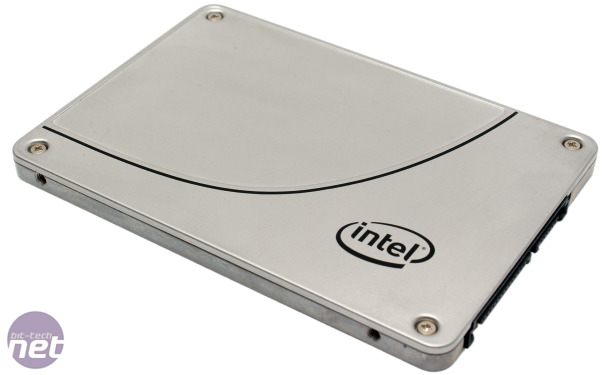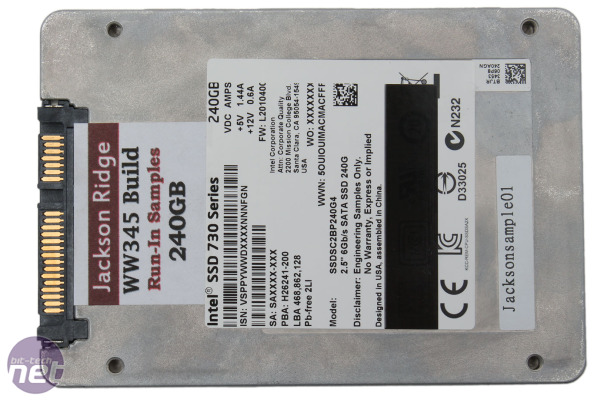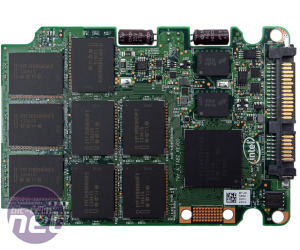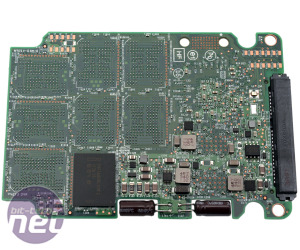Intel SSD 730 240GB Review
Manufacturer: IntelUK price (as reviewed): £177.43 (inc VAT)
US price (as reviewed): $239.99 (ex Tax)
In recent years, Intel's SSD focus has shifted from the consumer space to the enterprise one. Until now, its highest end consumer drives have been based on the SandForce SF-2281 controller, and have thus been perfectly serviceable but nothing special and little different to the masses of other such SSDs. However, the new flagship SSD 730 changes that. It's Intel's first fully in-house consumer drive for a long time and, as you'll see, it's heavily influence by Intel's experience in the enterprise market. It targets enthusiasts with demanding storage needs rather than “everyday” users, and is optimised for tasks like content creation and video capture and editing. Pre-orders are open now, with general availability expected March 18th.
The SSD 730 is available in two capacities only: 240GB and 480GB. The hardware is the same in both, but performance and endurance are improved on the beefier model. Both drives share maximum sequential read speeds of 550MB/sec, but the 240GB drive's sequential write speed is limited to 270MB/sec compared to 470MB/sec on the 480GB. Intel also quotes 4KB random read/write speeds: 86,000/56,000 IOPS for the 240GB and 89,000/74,000 IOPS for the larger drive. As for endurance, both drives will ship with a five year warranty, but for the 240GB this covers host writes of up to 50GB/day (91TB total) while the 480GB is covered for up to a whopping 70GB/day (128TB total).
A more interesting specification is idle power consumption, which is said to be 1.5W. This may not seem like much, but it's a lot for an SSD, as some drives consume less than 0.1W when idle – the SSD 730 is not designed with mobile users in mind.
The drive itself fits the 7mm 2.5-inch form factor and has a fairly plain metal casing, and our samples at least were lacking the skull logo seen in the official product photography. Insulating sheets inside protect the PCB from the metal surroundings, and there is no cooling pad for the controller.
The SSD 730's controller is the same third generation eight-channel Intel controller seen in the enterprise DC S3700 drive. It was built by Intel from the ground up with a focus on performance consistency – in server applications, for example, this is more relevant than peak performance. However, peak performance is important in the consumer space, and Intel appears to have taken some note of this, as the controller has been given a 50 percent factory overclock, from 400MHz to 600MHz. Likewise, the NAND bus now runs 20 percent quicker at 100MHz compared to 83Mhz before. Intel has also re-engineered the firmware to be better suited for consumer workloads. However, while AES 256-bit encryption is supported, the Opal 2.0 and IEEE-1667 specifications are not, so hardware accelerated encryption is off the cards.
Next to the controller on the PCB are two IMFT DDR3-1600 cache chips. As ever, most of the remaining PCB space is allocated to the NAND packages. The NAND used in the Intel SSD 730 is Intel's own ONFI 2.1 20nm MLC variety. In the 240GB model, there are eight packages on the front of the PCB, each containing two 128Gbit dies (32GB per package), with an extra package containing a single die on the rear – this is not user accessible space and is solely used for redundancy to protect against wear levelling and die level failures. The fact that there are only two NAND dies per channel on the controller explains the lower write speeds of the 240GB model.
You may also have noticed two capacitors soldered to the edge of the PCB. As with the enterprise S3700, these are there to provide protection against power loss; should power fail, they will supply enough juice for the drive to flush cached data to the non-volatile NAND.
Naturally, the SSD 730 is supported by Intel's SSD Toolbox software. Its friendly UI is matched to a host of useful functions, from simple firmware updates to diagnostics and system optimisation, making it a useful tool.
Finally, Intel's press materials spoke of excellent scaling in RAID 0 configurations when using an Intel storage controller and the Intel Rapid Storage Technology driver. While a RAID 0 set-up may not be to everyone's taste, Intel supplied us with two SSD 730 240GB drives, and we felt obliged to put the claim to the test. We've tested the RAID array in our synthetic tests only, as PCMark 7 cannot target secondary drives when they are dynamic disks. We have also tested two Samsung SSD 840 Evo 250GB drives in the same RAID 0 set-up for comparison.
Specifications
Interface: SATA 6GbpsNominal capacity: 240GB (~7 percent over-provision)
Formatted capacity: 223.57GB
Controller: Intel PC29AS21CA0
Cache: 2 x IMFT 256MB(?) DDR3-1600
Memory type/amount: 8 x 32GB Intel 20nm MLC NAND
Warranty: Five years (with max. 50GB/day host writes)

MSI MPG Velox 100R Chassis Review
October 14 2021 | 15:04














Want to comment? Please log in.